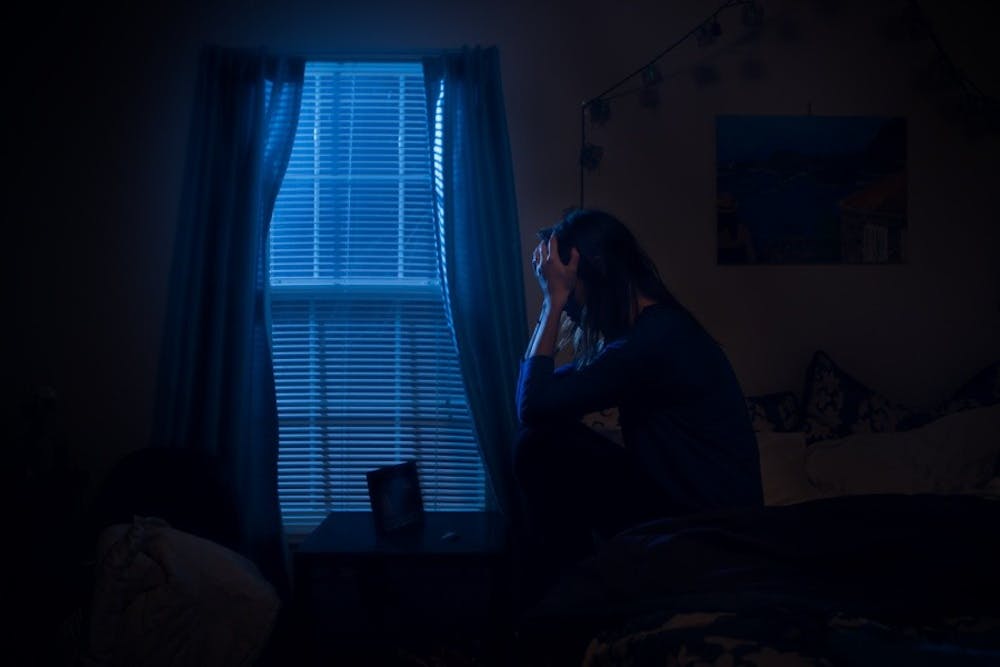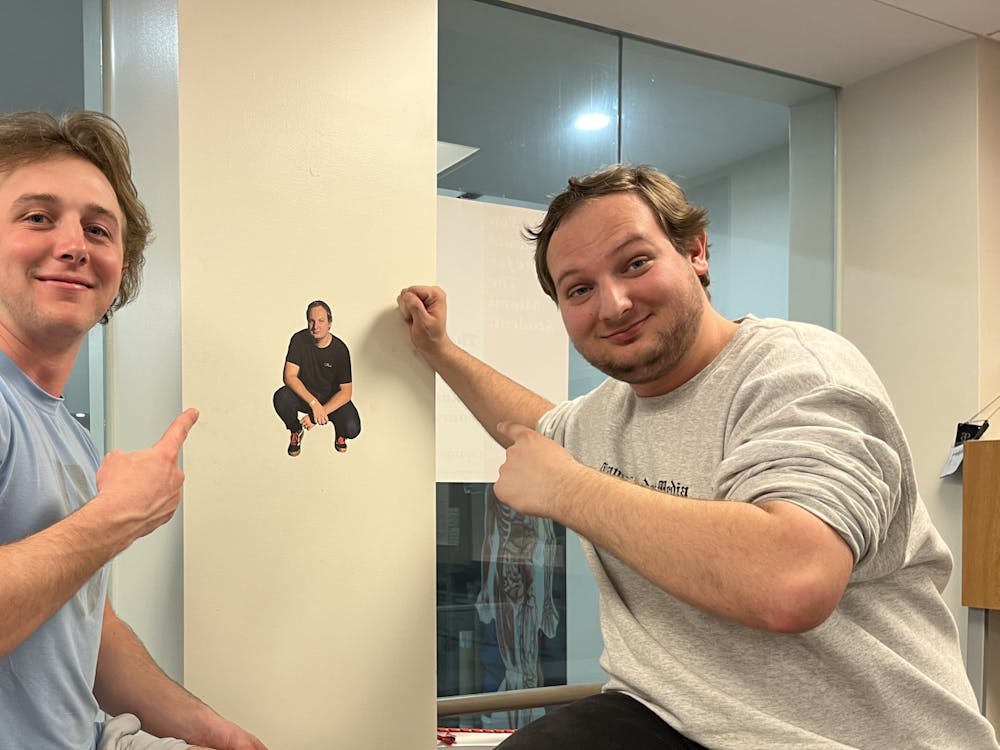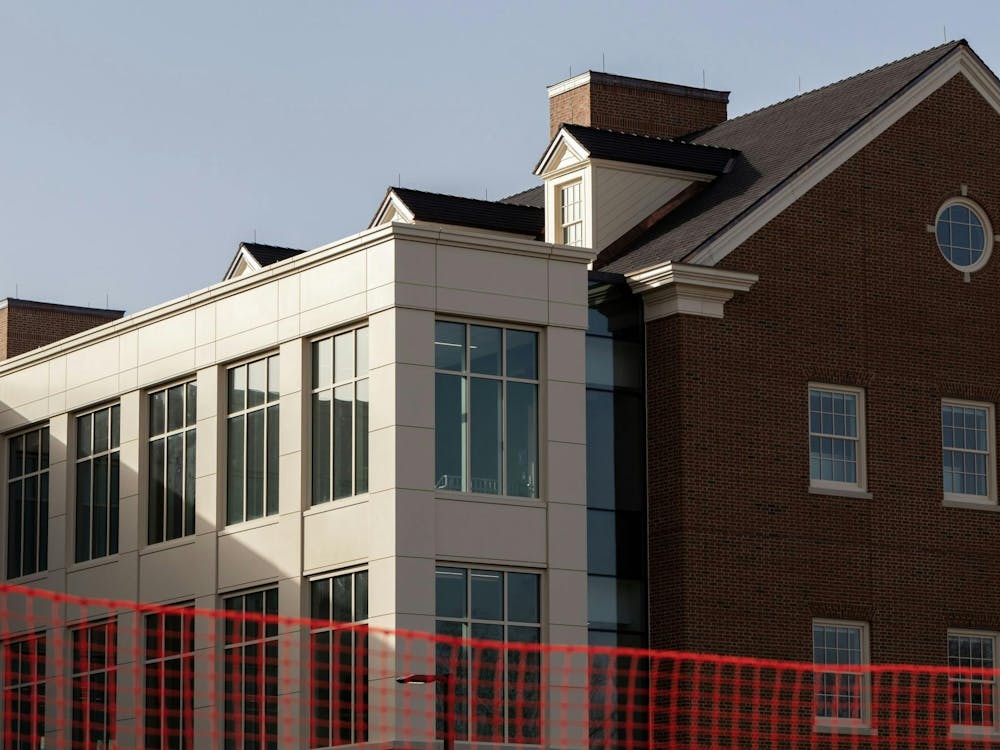By Carleigh Turner, Web Editor
The Miami Student does not intend to diagnose the individual in this article with post-traumatic stress disorder (PTSD).
It was the second or third week of the school year and Jane Doe was
Peering over her shoulder, where the pillow had just been, was the perpetrator of her sexual assault, casually smoking a cigarette and staring her in the face.
"I jumped out of bed and was sprinting at both sides of my room trying to open the doors but they were locked," Doe said in an email interview. "I was screaming and screaming as I shook the doorknob and looked back and he was still sitting straight up in my bed staring at me."
Then, her phone light up, her roommate had heard her screams and was calling to make sure she was okay. Doe ran and answered her phone. As she talked to her roommate, she realized what was happening to her.
"At that point I sort of realized I was hallucinating, but it didn't matter. I needed to get out of the room," Doe said. "I knew it was just a night terror, but I couldn't go back to that room unless it was morning and I could see everything in a different light."
Doe had experienced night terrors in the past, which allowed her to recognize what was happening.
Night terrors or nightmares are, in fact, a common symptom of PTSD for many individuals, according to Dr. Aaron M. Luebbe, who is the Robert H. & Nancy J. Blayney assistant professor of psychology at Miami University.
People with PTSD experience intrusion symptoms, which can include nightmares, flashbacks or physiological distress when experiencing cues that remind the individual of the traumatic event (or, "triggers"), Luebbe said.
One in five women and one in 16 men will be sexually assaulted in college, according to the National Sexual Violence Resource Center, and 50 percent of those women may live the remainder of their lives with PTSD, the U.S. National Comorbidity Survey estimates.
PTSD symptoms include avoidance, partial amnesia of the event, hypervigilance, intrusive memories, emotional numbing and negative alterations in belief systems, according to Dr. Terri Messman-Moore, the O'Toole Family Professor and Director of Clinical Training in the Department of Psychology at Miami.
Enjoy what you're reading?
Signup for our newsletter
Over the past four years, Miami's sexual assault reporting rates have been inconsistent. No one is able to point to the exact reasons for this, but one of the less explored causes may be the potential development of PTSD in sexual assault survivors.
In the last three years combined, 49 Miami students have reported sexual assaults, according to data reported through the Clery Act-the federal law requiring colleges and universities to report data on campus crimes. But that number is significantly lower than the national average.
Nadia Dawisha, a researcher and advocate for survivors of sexual assault, has done the math.
"If there are 7,000 women, and if you really lowball the number and say 10 percent of them have been assaulted during their four-to-five-year college experience, then we are looking at 700 women [being sexually assaulted]," she said. "That is far more than the reported estimates."
That discrepancy, though, is normal. Sexual assault is the most underreported crime in the U.S., with 68 percent of sexual assaults never being reported to police, according to the Rape, Abuse and Incest National Network.
"Obviously, we often don't know why some individuals don't report because they fly under the radar, so to speak," said Luebbe. "Reasons certainly vary from individual to individual but include things like feelings of guilt or shame, fear of how others will respond or of not being taken seriously, or fear of what might happen if the perpetrator were to find out."
Another factor that could influence reporting may be the severity of trauma reactions following an assault, according to Luebbe.
Doe decided not to report her sexual assault because thinking and talking about it was becoming detrimental to her daily routines and school work.
"I needed to continue focusing on my life and not think about it," Doe said. "I wasn't gonna let it bring me down or affect how I go about living my life."
However, she did report her sexual assault to Becca Getson, the sexual assault response coordinator at Miami. Doe does not feel that her PTSD symptoms had any effect on not taking her case further.
Getson said that she believes PTSD symptoms definitely have an impact on whether or not people report.
"Avoidance is a very prominent [symptom] that we tend to see," she said. "Not wanting to talk about it, not wanting to go back to a place where it occurred, not wanting to answer questions about it … smells, sights, sounds all of those types of things can cause triggers. Memories can be really difficult with someone who has been traumatized."
Another symptom PTSD sufferers may experience is amnesia or partial amnesia of the traumatic event, which can make therapy and reporting details of his or her assault difficult.
"We have some evidence that memories that are highly stressful and traumatic are processed by different areas of the brain," Messman-Moore said. "They are more emotions-based memories versus cognitive-based memories so they're activated in different ways and it's harder to get access to them."
A survivor's memory may also be affected by brain damage due to head trauma or substances that may have been in his or her system at the time of the assault.
"Because it's stored differently, survivors may not be able to access it the same way," Getson said. "[A survivor] may be all over the board in terms of trying to relay that information. That's not because they're trying to hide anything, it's not because they're trying to get themselves out of trouble. It might just be because that is the way their memory has stored it. "
However, this is not always the case, because PTSD is a "dose-related" disorder. Meaning, not all sexual assault survivors develop chronic PTSD, according to Messman-Moore.
"The more trauma you have and the worse it is, the more likely you will develop PTSD," Messman-Moore said.
Though Doe said she has not been clinically diagnosed with PTSD, her symptoms do appear from time to time. A year after her assault, Doe says she is doing well in her recovery.
"It doesn't affect me day-to-day, which is what I initially wanted," she said. "I'm focusing on my future and myself."
That being said, it is near impossible to predict who will get PTSD. However, there are a few ways to potentially increase the risk of experiencing it.
When someone discloses that they have been sexually assaulted to someone, the person they tell has the power to retraumatize them or not, according to Messman-Moore.
"Negative reactions are not common, maybe less than 25 percent of the time. However, when they do happen, they are powerful," said Messman-Moore. "Negative reactions to disclosure can influence the PTSD symptoms."




